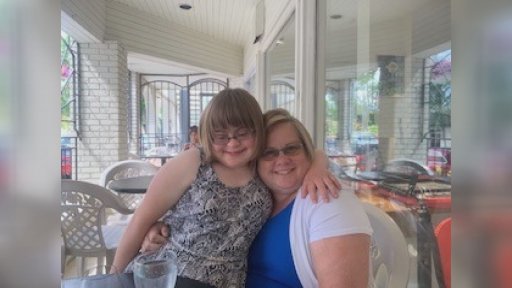Parents and advocacy groups in Manitoba say the vaccine priority plan leaves out many people who are immune-compromised or considered high risk to COVID-19.
Lori Lester’s daughter, Hailey, has Down syndrome and a congenital heart defect, putting her at a higher risk.
“As a parent, we’re worried. Every day is a worry,” Lester told Global News.
“If she does catch COVID, it’s a roll of the dice what the effect on her would be.”
Read more:
Down syndrome advocates push for vaccine priority citing increased health risks
Recent studies have shown that those with Down syndrome are more likely to contract COVID-19 and have a more severe outcome, including 10 times more likely to die.
Hailey turns 18 in May, putting her at the back of the line of the province’s vaccine priority list. Lester says while she understands the need to prioritize certain age categories, she feels the province’s plan is putting Hailey’s life at risk.
“I feel, as a parent, you’re missing some people like Hailey,” Lester said.
“So someone who’s 40 and healthy is getting a vaccine before she is. In the vaccine rollout, she would be the last group to get the vaccine.”

Lori Lester (right) says Manitoba’s vaccine priority plan is putting her daughter Hailey at risk.
Courtesy / Lori Lester
Lester says with the exception of running a few brief errands during the summer when cases were lower, Hailey has been isolating since the start of the pandemic. She hasn’t been attending school in person, due to her risk.
That isolation is also taking its toll on Hailey.
“The isolation has been really hard on her. She’s an extremely social person,” Lester said, adding that she worries how Hailey will return to her normal routine once she’s able to go out in public.
Prioritizing people with intellectual disabilities who are more at risk of COVID-19 is something Inclusion Winnipeg has been advocating for.
Read more:
Coronavirus: People with intellectual disabilities included in Saskatchewan vaccine rollout
“If someone is healthy, that’s where we’d want them to be,” said Janet Forbes, executive director of Inclusion Winnipeg. “We don’t necessarily want to have people lumped together all having intellectual disabilities, because we believe that there are some people (with intellectual disabilities) that have no underlying health concerns, they’re healthy and they can wait.”
But Forbes said certain conditions, including Down syndrome, put some at greater risk.
“Someone who has Down syndrome, for example, they often age prematurely, so they have the physiology of someone who is much older,” Forbes said. “They often also have heart (defects). Their hearts are impacted with Down syndrome as well as some respiratory problems, so that would put them at higher risk for them.”
The province is taking an aged-based approach to its vaccine rollout plan, focusing on health care workers, the elderly, and personal care homes first.
“The short answer is that older Manitobans are most at risk,” said Dr. Joss Reimer, the medical lead of Manitoba’s vaccine implementation task force, during a press conference Wednesday.
“While we clearly see those with underlying medical conditions are at greater risk, the risk is not as high as those over the age of 70.”
Health officials say they’re vaccinating who they can with the supplies they have.
“It’s not a matter of vaccinating older Manitobans and those with underlying medical conditions. This is an either-or situation right now,” Dr. Reimer said, noting that the case-fatality rate for people over the age of 70 is 19.4 per cent, meaning one in five people over the age of 70 who contract COVID-19 die.
Read more:
Manitoba agrees to purchase 2M doses of Providence Therapeutics coronavirus vaccine
Dr. Reimer did acknowledge that they will reassess once vaccine supplies become more readily available, and prioritizing higher risk or immune-compromised groups isn’t off the table.
“For those that are waiting, I know it’s frustrating, I know it’s frightening and discouraging. So I am asking for patience,” she said.
“As I’ve said before, if I could give everybody a dose today, I would do that. This is a life-saving intervention. I don’t take that lightly.”
Questions about COVID-19? Here are some things you need to know:
Symptoms can include fever, cough and difficulty breathing — very similar to a cold or flu. Some people can develop a more severe illness. People most at risk of this include older adults and people with severe chronic medical conditions like heart, lung or kidney disease. If you develop symptoms, contact public health authorities.
To prevent the virus from spreading, experts recommend frequent handwashing and coughing into your sleeve. They also recommend minimizing contact with others, staying home as much as possible and maintaining a distance of two metres from other people if you go out. In situations where you can’t keep a safe distance from others, public health officials recommend the use of a non-medical face mask or covering to prevent spreading the respiratory droplets that can carry the virus. In some provinces and municipalities across the country, masks or face coverings are now mandatory in indoor public spaces.
For full COVID-19 coverage from Global News, click here.
